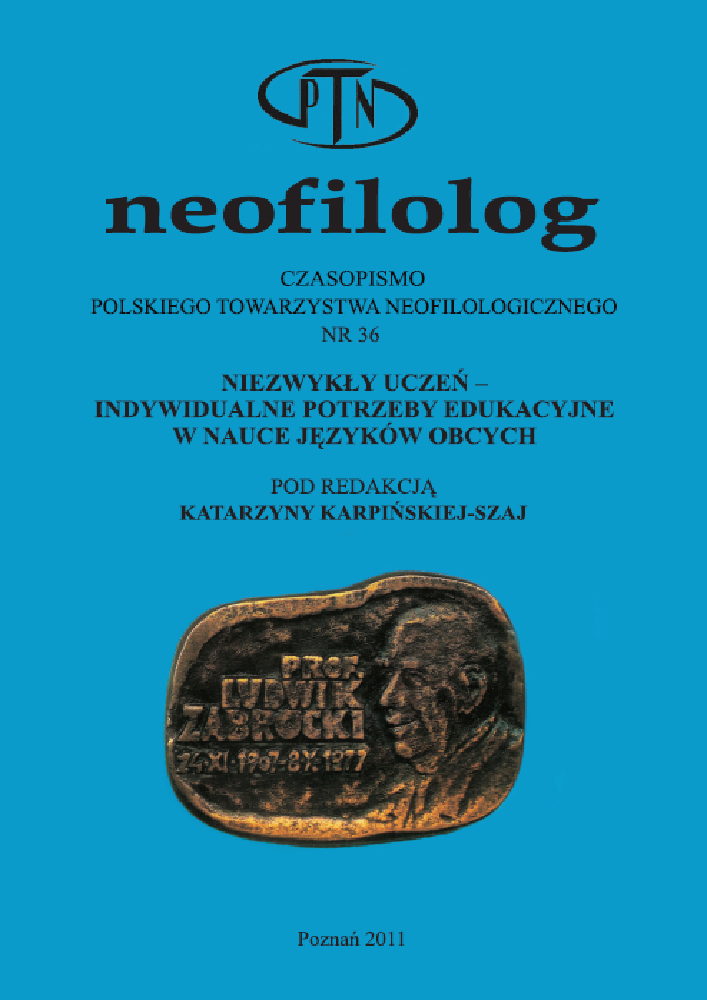Abstract
The paper reports the findings of a study that the author conducted in order to investigate the possibility of developing communicative compe-tence in a learner with Asperger‟s Syndrome. Information about the dis-order is followed by enquiry into the notion of the theory of mind which is said to determine the ability to communicate effectively. Since patients with Asperger‟s Syndrome do not demonstrate theory of mind, it is be-lieved they are unable to develop communicative competence. However, the literature in the field points to the therapeutic aspects of foreign lan-guage teaching and therefore the author explored the possibility of im-proving communicative skills in the case of a 13-year-old boy diagnosed with Asperger‟s Syndrome.
Literaturhinweise
Allman, T. 2009. Asperger’s Syndrome. Farmington Hills, MI: Lucent Books.
Atwood, T. 2007. The complete guide to Asperger’s Syndrome. London: Jessica Kingsley Publishers.
Baron-Cohen, S. 1995. Mindblindness: an essay on autism and theory of mind. MIT Press/Bradford Books.
Baron-Cohen, S., Leslie, A. M. i Firth, U. 1985. „Does the autistic child have a theory of mind?” Cognition, 21 (1985) 37-46.
Canale, M. i Swain, M. 1980. „Theoretical bases of communicative approaches to second language teaching and testing”, Applied Linguistics 1: 1-47.
Celce-Murcia, M. 2007. „Rethinking the role of communicative competence in language teaching”, w: Soler, E. A. i Jorda, M. P. S. (red.) Intercultural lan-guage use and language learning. Dordrecht: Springer, 41-59.
Emmons, P. G. i Anderson, L. M. 2007. Dzieci z zaburzeniami integracji sensorycznej. Warszawa: K. E. Liber.
Hymes, D. 1972. „On communicative competence”, w: Pride, J. B. i Holmes, J. (red.) Sociolinguistics. Harmondsworth: Penguin, 269-293.
Karpińska-Szaj, K. 2006. „Integracyjna koncepcja nauki języka obcego na potrzeby uczniów z niedoborami języka pierwszego”, w: Krieger-Knieja, J. i Paprocka-Piotrowska, U. (red.). Komunikacja językowa w społeczeństwie informacyjnym. Nowe wyzwania dla dydaktyki języków obcych. Lublin: Towarzystwo Naukowe KUL, 56-63.
Kurcz, I. 2005. Psychologia języka i komunikacji. Warszawa: Wydawnictwa Naukowe Scholar.
Nattinger, J. R. i DeCarrico, J. S. 1992. Lexical phrases and language teaching. Ox-ford: Oxford University Press.
Oxford, R. 1990. Language learning strategies: what every teacher should know. Boston, MA: Heinle & Heinle.
Pawley, A. i Frances S. 1983. „Two puzzles for linguistic theory: nativelike selec-tion and nativelike fluency”, w: Richards, J. C. i Schmidt, R. W. (red.) Language and communication. London: Longman, 197-227.
Premack, D. i Woodruff, G. 1978. „Does the chimpanzee have a theory of mind?” Behavioral and Brain Sciences, vol 1. 515-526.
Rausch, J. L., Johnson, M. E. i Casanova, M. F. 2008. Asperger’s Disorder. New York: Informa Healthcare Ltd.
Siek, Piskozub, T. i Wach, A. 2006. Muzyka i słowa. Rola piosenki w procesie przyswajania języka obcego. Poznań: Wydawnictwo Naukowe UAM.
Lizenz
Copyright (c) 2011 Tomasz Róg

Dieses Werk steht unter der Lizenz Creative Commons Namensnennung - Keine Bearbeitungen 4.0 International.
Autoren:
Die Autoren der zur Veröffentlichung in der Zeitschrift Neofilolog angenommenen Texte sind verpflichtet, den Vertrag über die Erteilung einer kostenlosen Lizenz für die Werke mit der Verpflichtung zur Erteilung einer Sublizenz CC auszufüllen, zu unterzeichnen und an die Adresse der Redaktion zurückzusenden.
Gemäß Vertrag erteilen die Autoren auf die in der Zeitschrift Neofilolog veröffentlichten Texte der Adam-Mickiewicz-Universität in Poznań eine nicht exklusive und kostenlose Lizenz und erlauben die Verwendung der Sublizenz Creative Commons Attribution-NoDerivatives 4.0 International (CC BY-ND 4.0).
Die Autoren behalten das Recht zur weiteren freien Verfügung über das Werk.
Benutzer:
Interessierte Onlinebenutzer dürfen die seit 2017 veröffentlichten Werke unter folgenden Bedingungen nutzen:
- Anerkennung der Urheberschaft - die Verpflichtung, zusammen mit dem verbreiteten Werk Informationen über die Urheberschaft, den Titel, die Quelle (Links zum Originalwerk, DOI) und die Lizenz selbst bereitzustellen;
- ohne Schaffung abgeleiteter Werke - das Werk muss in seiner ursprünglichen Form erhalten bleiben, ohne Zustimmung des Autors dürfen keine Studien, beispielsweise Übersetzungen, verbreitet werden.
Die Urheberrechte aller veröffentlichen Texte sind vorbehalten.
Sonstige:
Die Adam-Mickiewicz-Universität in Poznań behält das Recht auf die Zeitschrift als Gesamtheit (Layout, Grafik, Titel, Umschlagsprojekt, Logo usw.).
